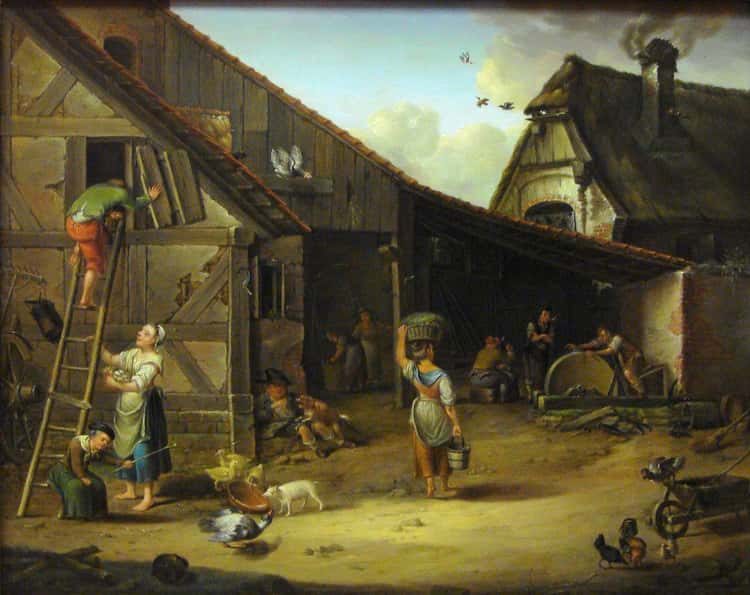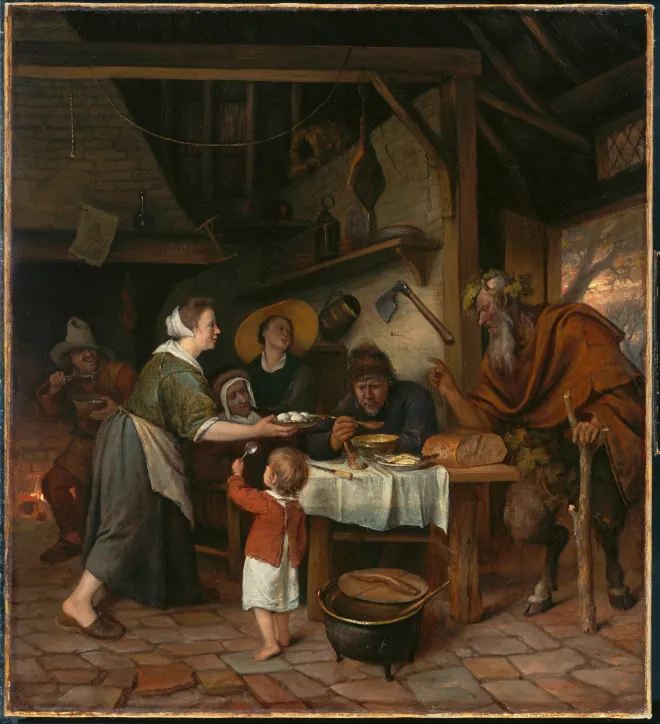You’ve done your research, gathered your allies, sharpened your swords, and stocked up on food and medicine. You’re ready to embark on your expedition to the dungeons beneath the ruins of old castle Schwarzeschwert. It’s a two-day ride away.
You’ve brought tents and bedrolls, but they’re not for the journey. They’re for setting up a camp at the entrance of the dungeon, there’s no reason to rough it between here and there. So where are you going to stay for the night?
Inns
An inn is probably the first thing you thought of, but there are a lot of reasons you might not be able to stay at an inn. For one inns can only be found on roads that are frequently travelled by wealthy potential patrons. A popular road can support an inn per day’s travel, a very popular road can have even more or larger and more spectacular inns. However many roads, especially the one’s you will be taking – off the beaten path to ruins and labyrinthine underground complexes, will not have inns most of the time, and the inns they have if any will be incredibly eery establishments.
Even if there is an inn on the way to the dungeon, there is a good chance you will not want to go. These establishments are geared towards wealthy merchants and nobles. Inns are nice places to get a quiet and comfy rest with your possessions securely stored, and during the day there is food and music in the hall. But the price tag is extortionate to anyone who doesn’t have a massive amount of cash to throw around. Not when you can get all that accommodation for the much nicer price tag of ‘free’.
Guest right
There exists a code, accepted by nearly all, that when someone comes to your home you offer them a place to stay. The rules aren’t formalized, and abusing this right (by being boorish, gluttonous, or overstaying what your hosts can reasonably accommodate) is considered even more heinous than denying it. Guest right makes it very easy to find safe place to sleep within an hour or so of nearly any point in the ruined queendom.

The way different sorts of people respond to guest right depends a lot on their social class.
Nobles do not believe guest right applies to common people and tend to reject any commoner who comes to the gates of their castles or manors, they also generally don’t trust commoners who they haven’t bought off leading to their patronage of inns. However, if you can convince a noble there is even a chance you are noble, however distant or minor, or that your quest is noble and for the good of their lands (which they will be skeptical of if they think you are common) then you can get in. While a noble patron won’t make much time to accommodate you unless you intrigue them or they are convinced you are peers, they will at least see to having their servants treat you to baths, fine foods, wine, and the comfiest bed you’ve ever slept in.
The Church takes guest right very seriously but does not especially believe in luxury. If you find your way to a church or monastery you will, no matter what your circumstance, get yourself a bowl of gruel and a stiff bunk bed to sleep on. You will pay for this in the form of manual labour, churches are always in need of sweeping and washing and they will put you to work. If they suspect you have cash you will be expected to offer some or even most of it as a tithe.
The preference for most adventurers is going to be peasants, most peasants take guest right seriously too and they believe guests should be treated as a sort of temporary member of the family. This is in large part because it is how peasants themselves travel, so it pays off to have a culture of accommodating those who need a place to rest. Peasants will give you good food, although they likely only have enough beds for a guest or two, not a party of five or more. However, they will generally do all they can to accommodate you, at worst they will find space for you in the barn. Peasants are especially accommodating to people who are loose with interesting gossip. It is not required but it is considered good manners to help with the harvest, cleaning, or repairs in the morning after.
City and town folk are generally a little less trusting than their rural peers. However, you can always get accommodation from a relative or a family friend in good standing, and there is a good chance someone in your party is probably related to someone in a nearby town or city. Outside of that, less formal inns are ubiquitous. Urban folk are always looking for cash, and the culturally expected guest room doesn’t make them any money when relatives aren’t over. These rented rooms are substantially cheaper than a formal inn as it’s just a side hustle to the owner.
Finally, hermits and old ladies living in cottages are stumbled upon more often than most by adventurers. While there are countless lurid tales about strangers in the woods, whose cottages are stumbled upon by wanderers, for the most part fiercely private folks living apart from civilization will either welcome the company or accommodate you outside. They tend to be touchy, and they won’t know much about local gossip (although they may know some interesting things about fae, spirits, and beasts nearby). It is only a tiny minority of old cottage ladies who bake their guests into pies.
Regardless of how you get guest right, expect better treatment if you bring a gift. The gift is not a required part of guest right but it is seen as good manners. The best gifts are food or drink, its considered gauche to offer someone money for guest right unless that is the explicit arrangement ahead of time.
Remember that guest right is incredibly important to people, the sort of thing that people know will result in their eternal damnation (or at least turn them into a pariah) if they violate. A boy just old enough to cook for himself whose family is off on business likely won’t fear for his safety if a half-dozen armed strangers ask courteously for guest right, he knows that he’d be damned if he refused them and they’d be damned if they abused his hospitality. Obviously, there are occasions where guest right is violated (it happens all the time to people who aren’t peers), but truly egregious breaches of guest right become famous quickly and utterly ruin the reputation of the offender.
A hidden advantage to guest right is that you tend to gather very useful rumours from this more social method of seeking lodging. The people in inns are busy, they generally don’t want to talk to people they haven’t already planned to talk to. But your noble, clerical, or peasant hosts know about local rumours and they might take a great interest in the romantic lives of adventurers. They can tell you about local problems too and naturally bring up sidequests in a way far more organic than a job board outside a tavern.
Another advantage is that it builds relationships, the first time you go somewhere guest right can be a tricky and uncertain thing. But if you prove yourself trustworthy, generous, and best of all interesting; you can build a network of places you know you can get a warm meal, or maybe even an odd job. Being a good guest means there is someone in a community who will vouch for you. It can be dangerous to be a stranger, especially an armed stranger, and this is one way adventurers make themselves familiar to people all across the queendom. If you’re doing anything particularly interesting, you might rapidly become famous for good or ill. Eventually, your reputation might precede you to the extent that there is no question you will receive guest right in any place you go… assuming that reputation is good of course.
Guest right even applies to a limited extent between kinds. The fae do not often petition mortals for guest right but when they do you’d be a fool to refuse them as it would be improper and angering a fae is never a good idea. Mortals too sometimes petition the fae for guest right, this is nearly always accepted but the fae are capricious hosts and will play pranks on their guest, but they will ensure no true harm comes to their guest.

Rarer yet undead or demons may ask guest right, although this is more fraught. The parable of the demon in the rain is debated by theologians to this day. A succubus, unable to make her way home to hell, petitioned a church for guest right. She said the rain would kill her firey hound if she could not find a place to stay. The church refused her, and the hound died. When the rain let up the church was swallowed in an inferno. Some argue the inferno was sent by the Eternal Queen, and that guest right is more sacred than the law to not consort with demons. Others say the demon started the blaze and the priest was right to turn her and her dog away. Others still take offence to the idea that demons could ever harm a church in open daylight in the realms of the Eternal Queen, although that position has weakened since the days of the Mistress of Ruin who undeniably did that very thing countless times. As for asking such creatures for guest right? It’s more likely to work than you’d think, not that the accommodations such creatures can offer will be terribly comforting.
Roughing It
If you decide against sleeping indoors you still have options other than pitching a tent, sleeping in barns or stables is incredibly common. It’s considered rude not to ask for guest right, but it’s also considered rude to wake someone in the night so there is a good chance if caught you will be forgiven, especially if you offer to do some labour. Worst case scenario you will be chased off.
If you do decide to sleep in the genuine middle of nowhere as you might be forced to do for places far off the beaten path you open yourself up to random encounters in the night and eating your own rations. This didn’t use to be as dangerous as it is today, but thanks to the Night War banditry by former soldiers, especially banditry by undead soldiers of the late mistress is commonplace. Fae beasts, undead monsters, even powerful demons are let loose upon the woods and hills between settlements. Even if you can overcome these foes when they ambush you: equipment will get damaged, ammo will be expended, and your interrupted sleep will leave you bleary and drained. Sleeping outdoors near settlements is often dangerous too: guards and soldiers assume anyone sleeping outside is scum of such low character they can’t manage to secure guest right, they will likely imprison or rob you on the assumption you are up to no good.
Unless you really have to, stick to farms, inns, and churches, and be skeptical of any journey that will take more than a day’s travel between places you can sleep with a roof over your head.

